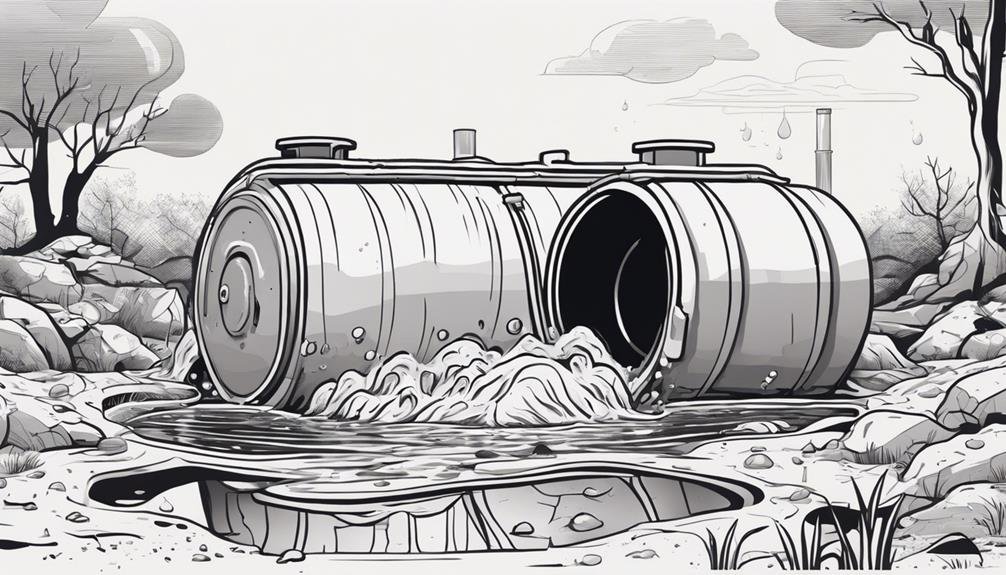You know the saying, 'An ounce of prevention is worth a pound of cure.' When it comes to your septic tank, following the right pumping frequency is key to avoiding costly issues down the line.
But how often should you actually pump your septic tank? Let's explore the 5 best recommendations to ensure your system runs smoothly and efficiently.
Key Takeaways
- Regular pumping prevents system overload and extends its lifespan.
- Following guidelines based on household size and usage habits is crucial.
- Prompt maintenance based on indicators like odors and slow drains.
- Professional pumping schedules help avoid costly repairs and ensure system functionality.
Factors Affecting Pumping Frequency

Understanding the various factors that influence the frequency of septic tank pumping is essential for maintaining optimal system functionality. Soil composition plays a significant role in determining how often your septic tank needs to be pumped. Soil types with high clay content can lead to poor drainage, requiring more frequent pumping. Additionally, groundwater levels in your area can affect how quickly the tank fills up, influencing the pumping frequency.
Household size and usage habits are also crucial factors to consider. A larger household with more occupants will naturally produce more wastewater, leading to a quicker accumulation of solids in the septic tank. Similarly, usage habits such as excessive water consumption or the disposal of non-biodegradable items can impact the tank's efficiency, necessitating more frequent pumping.
Typical Pumping Frequency Guidelines
To determine the appropriate pumping frequency for your septic tank, consider factors such as household size, wastewater production, and system usage habits. When it comes to typical pumping frequency guidelines, here are some key points to keep in mind:
- Household Size: Larger households typically generate more wastewater, leading to a faster fill-up of the septic tank. For a family of 4-6 people, experts recommend pumping every 3-5 years to prevent overflow and ensure optimal system performance.
- Wastewater Production: If your household uses a garbage disposal frequently or has high water usage due to activities like frequent laundry or long showers, it can increase the load on your septic tank. In such cases, consider pumping every 2-3 years to prevent backups and maintain efficiency.
- System Usage Habits: Being mindful of what goes down the drains and toilets can significantly impact the health of your septic system. Implementing water conservation practices and avoiding flushing non-biodegradable items can help extend the time between pump-outs, reducing both the environmental impact and costs associated with frequent maintenance.
Signs Indicating Pumping Need

When determining the need for septic tank pumping, it's crucial to recognize specific signs that indicate the necessity for maintenance. One key indicator is odor detection. Foul smells emanating from drains or the area around the septic tank can signal a full tank that needs immediate attention.
Ground saturation is another important sign. If you notice soggy or overly green patches in your yard near the septic tank, it could mean that the system is overloaded and needs pumping.
Backup prevention is vital. If you start experiencing slow draining sinks, toilets, or showers, it could be a warning sign that the septic tank is reaching its capacity.
Regular tank inspection is also essential. By checking the tank periodically for sludge levels and ensuring that the system is functioning correctly, you can proactively prevent issues that may lead to the need for pumping.
Importance of Regular Pumping
Regular septic tank pumping is crucial for maintaining the proper functioning of your system and preventing costly repairs. Neglecting this maintenance task can lead to various issues that may not only disrupt your daily activities but also result in significant expenses. Here's why regular pumping is essential:
- Prevention of System Failure: Over time, solid waste accumulates in the septic tank, causing it to reach its capacity. Regular pumping prevents the tank from becoming overloaded, which could lead to system failure and backups in your home.
- Enhanced System Longevity: By sticking to a consistent pumping schedule, you help extend the lifespan of your septic system. Removing accumulated sludge and scum ensures that the system operates efficiently, reducing the likelihood of major malfunctions.
- Cost Savings: Investing in regular septic tank pumping is a preventive measure that can save you money in the long run. By avoiding the need for extensive repairs or even a full system replacement, you protect your finances while maintaining a functional septic system.
Professional Pumping Schedule Benefits

Maintaining a professional pumping schedule for your septic tank offers numerous advantages in ensuring optimal system performance and longevity. By adhering to a consistent pumping routine recommended by experts, you stand to benefit in terms of cost savings and reduced environmental impact.
Professional pumping schedules help prevent costly septic system failures by identifying and addressing potential issues early on. By regularly pumping your septic tank, you can avoid the need for expensive repairs or replacements that may arise from neglect. This proactive approach not only saves you money in the long run but also extends the lifespan of your septic system.
Furthermore, adhering to a professional pumping schedule is environmentally responsible. Regular pumping helps prevent leaks, overflows, and contamination of the surrounding soil and water sources. By properly maintaining your septic system, you contribute to a healthier environment for yourself and future generations. Remember, investing in a professional pumping schedule now can lead to significant cost savings and a positive environmental impact down the line.
Frequently Asked Questions
Can Using Certain Household Cleaning Products Impact the Frequency at Which a Septic Tank Needs to Be Pumped?
Using certain household cleaning products like detergents, septic tank additives, and cleaners can impact your septic tank's pumping frequency. These products can introduce harmful chemicals that disrupt the tank's natural balance, leading to more frequent pump-outs.
Are There Any DIY Maintenance Tasks Homeowners Can Perform to Extend the Time Between Septic Tank Pumpings?
To extend time between pumpings, consider DIY maintenance like regular inspections for leaks and using septic additives. Did you know, according to EPA, a leaking toilet can waste up to 200 gallons daily?
How Does the Size of a Household or Amount of Water Usage Affect the Recommended Septic Tank Pumping Frequency?
Depending on your household size and water usage, the recommended septic tank pumping frequency varies. To extend time between pumpings, consider efficiency tips like reducing water waste and avoiding products that disrupt the tank's balance.
Are There Any Environmental Factors, Such as Soil Type or Landscaping, That Can Influence How Often a Septic Tank Needs to Be Pumped?
In considering soil composition for septic tank maintenance, the type of soil affects drainage and can impact pump-out frequency. Similarly, landscaping design, such as trees near the tank, can introduce roots that disrupt the system, necessitating more frequent pumping.
What Are the Potential Consequences of Neglecting to Pump a Septic Tank Regularly, Beyond Just the Risk of Backups and Odors?
Neglecting regular septic tank pumping is like driving a car without oil changes; it can lead to sewage backups, foul smells, groundwater contamination, and potential health hazards. Environmental impact includes soil and water pollution.
Conclusion
In conclusion, maintaining a regular septic tank pumping schedule is crucial to prevent costly repairs and ensure proper functioning of your system. By following recommended pumping frequency guidelines and staying alert for signs of needing a pump, you can extend the lifespan of your septic tank.
So, why risk potential issues when a simple pumping schedule can keep your system running smoothly?

